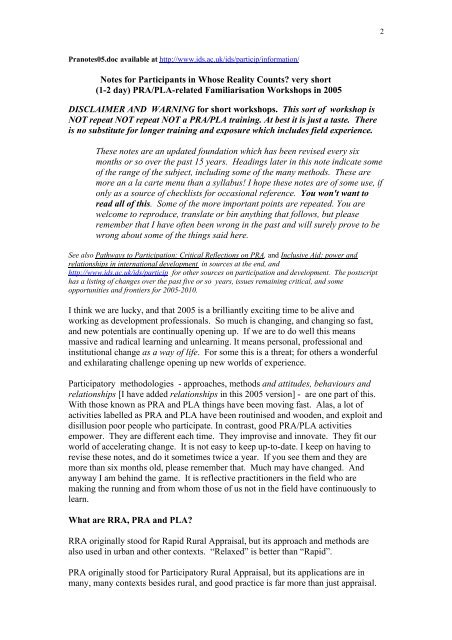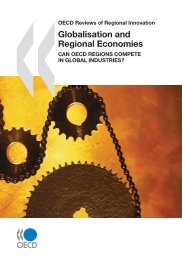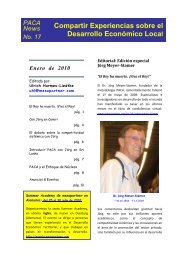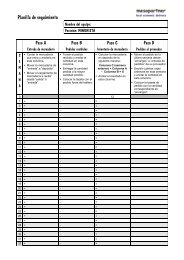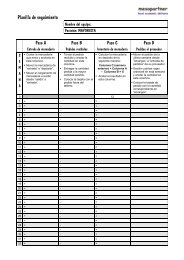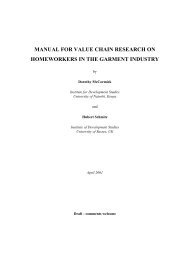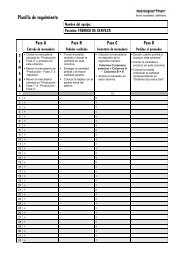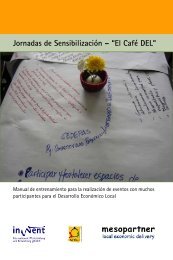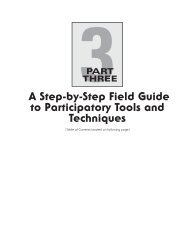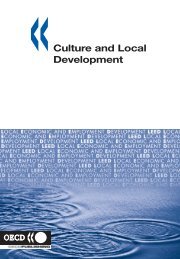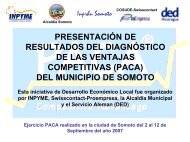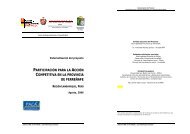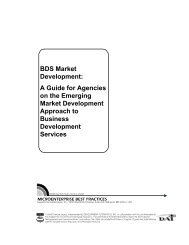R Chambers - Notes for participants in PRA-PLA course.pdf - PACA
R Chambers - Notes for participants in PRA-PLA course.pdf - PACA
R Chambers - Notes for participants in PRA-PLA course.pdf - PACA
You also want an ePaper? Increase the reach of your titles
YUMPU automatically turns print PDFs into web optimized ePapers that Google loves.
2<br />
Pranotes05.doc available at http://www.ids.ac.uk/ids/particip/<strong>in</strong><strong>for</strong>mation/<br />
<strong>Notes</strong> <strong>for</strong> Participants <strong>in</strong> Whose Reality Counts? very short<br />
(1-2 day) <strong>PRA</strong>/<strong>PLA</strong>-related Familiarisation Workshops <strong>in</strong> 2005<br />
DISCLAIMER AND WARNING <strong>for</strong> short workshops. This sort of workshop is<br />
NOT repeat NOT repeat NOT a <strong>PRA</strong>/<strong>PLA</strong> tra<strong>in</strong><strong>in</strong>g. At best it is just a taste. There<br />
is no substitute <strong>for</strong> longer tra<strong>in</strong><strong>in</strong>g and exposure which <strong>in</strong>cludes field experience.<br />
These notes are an updated foundation which has been revised every six<br />
months or so over the past 15 years. Head<strong>in</strong>gs later <strong>in</strong> this note <strong>in</strong>dicate some<br />
of the range of the subject, <strong>in</strong>clud<strong>in</strong>g some of the many methods. These are<br />
more an a la carte menu than a syllabus! I hope these notes are of some use, if<br />
only as a source of checklists <strong>for</strong> occasional reference. You won't want to<br />
read all of this. Some of the more important po<strong>in</strong>ts are repeated. You are<br />
welcome to reproduce, translate or b<strong>in</strong> anyth<strong>in</strong>g that follows, but please<br />
remember that I have often been wrong <strong>in</strong> the past and will surely prove to be<br />
wrong about some of the th<strong>in</strong>gs said here.<br />
See also Pathways to Participation: Critical Reflections on <strong>PRA</strong>, and Inclusive Aid: power and<br />
relationships <strong>in</strong> <strong>in</strong>ternational development <strong>in</strong> sources at the end, and<br />
http://www.ids.ac.uk/ids/particip <strong>for</strong> other sources on participation and development. The postscript<br />
has a list<strong>in</strong>g of changes over the past five or so years, issues rema<strong>in</strong><strong>in</strong>g critical, and some<br />
opportunities and frontiers <strong>for</strong> 2005-2010.<br />
I th<strong>in</strong>k we are lucky, and that 2005 is a brilliantly excit<strong>in</strong>g time to be alive and<br />
work<strong>in</strong>g as development professionals. So much is chang<strong>in</strong>g, and chang<strong>in</strong>g so fast,<br />
and new potentials are cont<strong>in</strong>ually open<strong>in</strong>g up. If we are to do well this means<br />
massive and radical learn<strong>in</strong>g and unlearn<strong>in</strong>g. It means personal, professional and<br />
<strong>in</strong>stitutional change as a way of life. For some this is a threat; <strong>for</strong> others a wonderful<br />
and exhilarat<strong>in</strong>g challenge open<strong>in</strong>g up new worlds of experience.<br />
Participatory methodologies - approaches, methods and attitudes, behaviours and<br />
relationships [I have added relationships <strong>in</strong> this 2005 version] - are one part of this.<br />
With those known as <strong>PRA</strong> and <strong>PLA</strong> th<strong>in</strong>gs have been mov<strong>in</strong>g fast. Alas, a lot of<br />
activities labelled as <strong>PRA</strong> and <strong>PLA</strong> have been rout<strong>in</strong>ised and wooden, and exploit and<br />
disillusion poor people who participate. In contrast, good <strong>PRA</strong>/<strong>PLA</strong> activities<br />
empower. They are different each time. They improvise and <strong>in</strong>novate. They fit our<br />
world of accelerat<strong>in</strong>g change. It is not easy to keep up-to-date. I keep on hav<strong>in</strong>g to<br />
revise these notes, and do it sometimes twice a year. If you see them and they are<br />
more than six months old, please remember that. Much may have changed. And<br />
anyway I am beh<strong>in</strong>d the game. It is reflective practitioners <strong>in</strong> the field who are<br />
mak<strong>in</strong>g the runn<strong>in</strong>g and from whom those of us not <strong>in</strong> the field have cont<strong>in</strong>uously to<br />
learn.<br />
What are RRA, <strong>PRA</strong> and <strong>PLA</strong>?<br />
RRA orig<strong>in</strong>ally stood <strong>for</strong> Rapid Rural Appraisal, but its approach and methods are<br />
also used <strong>in</strong> urban and other contexts. “Relaxed” is better than “Rapid”.<br />
<strong>PRA</strong> orig<strong>in</strong>ally stood <strong>for</strong> Participatory Rural Appraisal, but its applications are <strong>in</strong><br />
many, many contexts besides rural, and good practice is far more than just appraisal.


